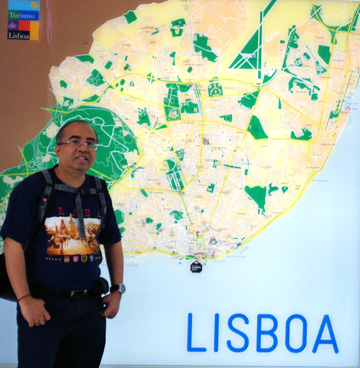新任スタッフ紹介 37
Self-Introduction

THUFAIL, Fadjar Ibnu
(2014年10月外国人研究員着任)
I am a researcher at the Research Center for Regional Studies of the Indonesian Institute of Sciences (PSDR-LIPI) in Jakarta. I received my Ph.D. from the Department of Anthropology at the University of Wisconsin-Madison in 2007. My dissertation titled “Figures in the May 1998 Riots: Imagining the State in Post-New Order Indonesia,” which examines how media, eyewitness, and investigative narratives of the May 1998 riots in Indonesia construct the figures of provokator (provocateur) and etnik Cina (ethnic Chinese). In the dissertation I argued that the narratives of the riots represent not only the experience of the riots but also the imaginary realms people evoke when telling the stories of the event.
I have received research fellowship from MacArthur’s Global Security Fellowship, Social Science Research Council, and the Wenner-Gren Foundation for Anthropological Research. In addition, I received study fellowships from Fulbright, Rockefeller Brothers, Scott-Kloeck Jenson, the University of Madison’s Center for Southeast Asian Studies Fellowship, and Presidential Fellowship of the University of Wisconsin. After completing my Ph.D, I joined Max Planck Institute for Social Anthropology in Halle/Salle (Germany) from 2007 to 2010 as a postdoctoral research fellow. Then from 2010 to 2013 I became a member of Project Group on Cultural Property at the University of Goettingen. At Max Planck and Goettingen, I conducted research on the legal dimension of ethnic conflict and the politics of indigeneity. At TUFS I will draw on this research on indigeniety to investigate and write an article on narrated performativity of indigeniety and adat.
My selected publications include “Ninjas in Narratives of Local and National Violence in Post-Soeharto Indonesia” in Beginning to Remember: The Past in the Indonesian Present, edited by Mary Zurbuchen (Seattle: University of Washington Press, 2005), “Riding the Postmodern Chaos: A Reflection on Academic Subjectivity in Indonesia,” in Diversifying and Decentring Southeast Asian Studies, edited by Goh Beng Lan (Singapore: ISEAS Press, 2011), The Social Life of Reconciliation: Religion and the Struggle for Social Justice In Post-New Order Indonesia (Max Planck Institute for Social Anthropology Working Paper Series, 2011), “When Peace Prevails on Kasih Hill: The Protestant Church and the Politics of Adat in Minahasa,” Asian Ethnicity 13: 4 (2012). In addition to the articles, I have published (with Martin Ramstedt) Kegalauan Identitas (Jakarta: Grasindo, 2011) and edited (also with Martin Ramstedt) a special issue of Asian Ethnicity, Vol. 13: 4 (2012). My latest publication is “Becoming Aristocrats: Keraton in the Politics of Adat” in Adat and Indigeneity in Indonesia, edited by Brigitta Hauser-Schaeublin (Goettingen: Goettingen University Press, 2013).
I came to the ILCAA-TUFS for the second time by invitation from Dr. Asako Shiohara to assist the ILCAA to develop a network to document minority languages in Indonesia. Linguistic and ethnographic study of language has received a priority as one of the national research interests at the Indonesian Institute of Sciences (LIPI), and at the ILCAA I will help Dr. Shiohara to establish a mutual and hopefully a long-term research cooperation between the ILCAA and the LIPI, focusing on the documentation method and storage facilities that the public can use for carrying out integrated research on local languages in Indonesia. While working on developing research cooperation between the ILCAA and the LIPI, I am also interested in exploring the place of language research in scientific endeavor in Indonesia, applying some insights from science, technology, and society (STS) studies to examine the transformation of expert knowledge from the field to computer programming. At the same time, during my stay at the ILCAA I would like to continue my previous research on adat and aristocracy to write an article on how language and embodied narratives shape aristocratic subjectivity.
Copyright © 2010 Research Institute for Languages and Cultures of Asia and Africa. All Rights Reserved.
